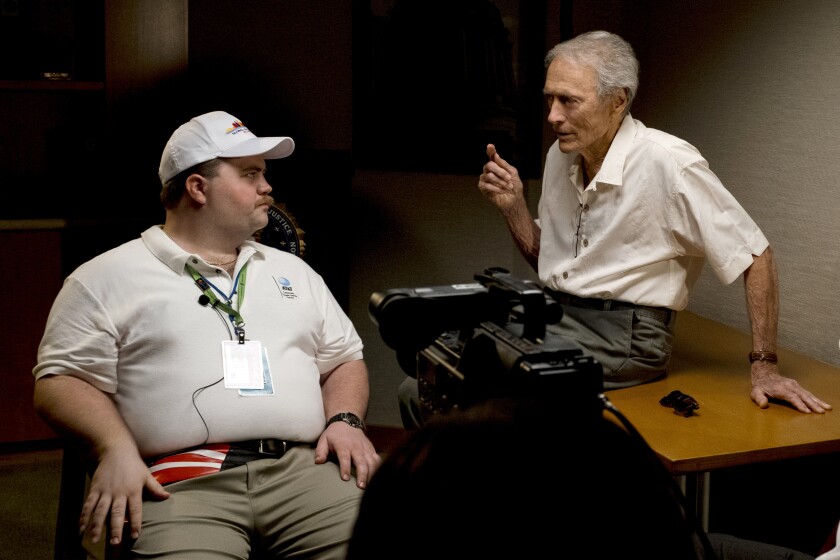The Atlanta Olympic bombing in 1996 was a particularly frightening moment in American history. The country was still reeling from the Oklahoma City bombing only 16-months earlier and the Olympics stood as a symbol of celebration and unity. On the evening of July 27th, a pipe bomb exploded in Centennial Park, ultimately killing two people and injuring 111 more. Richard Jewell does cover the event itself but it’s more of a character portrait about the man at the center of the investigation and how his act of heroism placed him at the center of a national investigation.

Why Director Clint Eastwood was invested in making this movie at this time is curious. Maybe it has something to do with his political affiliation since the protagonist here becomes the target of a massive media and government investigation…probably not a coincidence. He’s taken on quite a lot of “based on a true story” projects in recent years and Billy Ray’s screenplay is based on the Vanity Fair article “American Nightmare: The Ballad of Richard Jewell” by Marie Brenner. The script is probably funnier than you’d expect given the subject matter and Eastwood doesn’t really get a lot of credit for how he effectively weaves humor into his films. However, a nice bit of situational and character writing from Ray felt very natural and helped create a distinct tone for the film. The bombing itself was no joke and it’s handled with the proper respect on screen but this is ultimately a story of persecution at the hands of the FBI and national media. I don’t think this will end up being one of his legacy films but the soon-to-be 90-year-old filmmaker once again proved he is capable of making entertaining, substantive, and enjoyable films of all genres.

If there was ever anyone born to play Richard Jewell in a movie, it’s Paul Walter Hauser. The resemblance is uncanny. While Hauser has been acting for over a decade, he started to gain notoriety with roles in I, Tonya and BlacKkKlansman. This was definitely his most high-profile role to date and he was essential in portraying Jewell as a sympathetic character. He isn’t made out to be the brightest guy in the world but his intentions were honorable and Hauser found the sweet spot between those two defining characteristics. When I think about the best performances of the year, his was one of the better ones, although it’s tough to pin down exactly where he falls on that list. It should be the kind of performance that elevates his stock moving forward.
Hauser was never going to sell this movie by himself so Casting Director Geoffrey Miclat surrounded him with A-list talent in every direction. Two-time Golden Globe winner Jon Hamm was a great asshole as FBI Agent Tom Shaw who has a hardon for Jewell despite and real evidence. He’s got that unique ability to play the heel just as well as the hero and he’s plenty loathsome here. Oscar-winner Sam Rockwell played Jewell’s lawyer Watson Bryant. Whatever role you stick him in, he excels and this was no exception. Kathy Bates was something of an odd fit for the role of Jewell’s mother Bobi. It’s not that she was bad, undeniably talented as she is, I just never got past seeing Bates instead of the character. There is one scene late where it makes sense for the majority of the film but it felt like a loose fit.

Even with all of those amazing performers, Olivia Wilde stood out the most playing Atlanta Journal-Constitution reporter Kathy Scruggs, who died in 2001. It was an entertaining role that showcased her versatility as she embodied the predatory nature and loathsome characteristics people have come to despise from those in the media. Though Wilde was good, her portrayal of Scruggs came under fire as those closest to the reporter have called it offensively inaccurate. In fact, the AJC newspaper has filed a defamation lawsuit against Eastwood and Ray. Wilde claimed to have done extensive research but that claim was largely disproven by the AJC. She did a good job with the character she was given but that will largely go unnoticed now.
Yves Bélanger returned to direct photography after working with Eastwood on The Mule (2018) and it seems like the two have nice working chemistry. Not every shot is a masterpiece but the cinematography doesn’t play as large of a role in a film like this that’s more character-driven. There is no mistaking this for an art film but Bélanger has a firm grasp on shooting intimate closeups and made some good choices in key situations. Also returning from The Mule, Arturo Sandoval composed a compelling original score that complimented the many different tonal elements of this story.

I don’t think Eastwood has made a movie I didn’t enjoy in the past two decades and probably a little further beyond that. Not everything is going to wind up in the Best Picture conversation but that doesn’t mean it’s not a good film. When it comes to the two-time Academy Award-winning Best Director, you know you’re going to have a pretty high ceiling when it comes to quality and the floor will be considerably higher than most other filmmakers. Richard Jewell is ultimately a very good movie but maybe not a great one. It seems to lack momentum going into the Oscars but it’s certainly one of the better films this year even if it doesn’t crack the top ten.
Recommendation: If you typically enjoy Eastwood’s films, this gives you a lot of his strengths as a filmmaker. The cast and the performances are excellent and there’s a very interesting moment in American history at the core. I think it can appeal both to people who remember the event and to those who would be learning about it for the first time.
